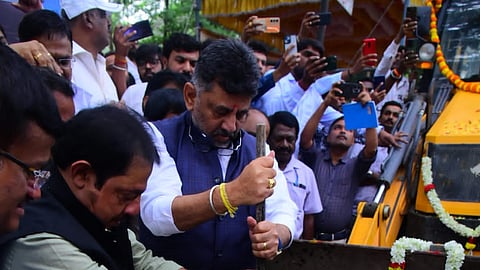

The massive Rs 1,800 crore white-topping project of roads began in Bengaluru on Monday, July 15. Deputy Chief Minister DK Shivakumar said that 157 kilometres of city roads would undergo white-topping to ensure longevity of the roads and reduce traffic congestion.
The white-topping project is part of the Sugama Sanchara Bengaluru and Brand Bengaluru initiatives. Shivakumar, while inaugurating the white-topping works, said that this approach would provide pothole-free roads that could last up to 25 years. The initial phase will cover a 19.67-kilometer stretch linking Chamarajpet, Gandhinagar, Malleshwaram, and Mahalakshmipuram assembly constituencies, costing Rs 200 crore.
Shivakumar said, “The roads in Bengaluru are prone to potholes. Hence, we will white-top roads to ensure they are pothole-free and durable. We will commence white-topping works in three to four wards daily, aiming to complete the work within the specified deadline.”
The Deputy Chief Minister also outlined a five-point program to enhance Bengaluru's infrastructure, focusing on drinking water, pothole filling, widening the property tax net, property tax collection, and clearing encroachments on Rajakaluve. He mentioned that both the Chief Minister Siddaramaiah and he had inspected various parts of Bengaluru to assess infrastructure and flood prevention works.
In addition to white-topping, the Bruhat Bengaluru Mahanagara Palike (BBMP) announced the deployment of 15 vehicles equipped with AI-enabled cameras to detect potholes and other road issues. “These vehicles will travel at 5 km per hour and cover 300 km daily. The data collected will help civic officials fix the roads,” said BBMP Commissioner Tushar Giri Nath.
However, the white-topping initiative has not been without controversy. Civic activists have raised concerns about the method, pointing out that cement is being poured over existing asphalt roads without properly removing the old layer, leading to elevated road levels and obstructed water drains. This has resulted in accessibility issues, especially for the elderly, and has not accounted for future utility line repairs, which would lead to excavation of the newly topped roads. Activists also argue that most of the roads being white-topped were recently tarred or already in good condition and the project is a misuse of public funds.